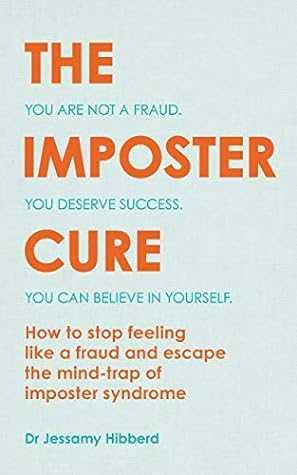Courtney Abbott's Key Ideas from The Imposter Cure
by Jessamy Hibberd
Ideas, facts & insights covering these topics:
15 ideas
·212K reads
968
23
Explore the World's Best Ideas
Join today and uncover 100+ curated journeys from 50+ topics. Unlock access to our mobile app with extensive features.
The Imposter Phenomenon
- Imposter syndrome was first described by two clinical psychologists in 1978.
- They coined the term ‘imposter phenomenon’, a condition in which people believe they are not worthy of success and have a persistent belief in their lack of intelligence, skills, or competence.
- Imposter syndrome involves much more than just feeling fraudulent and it presents itself in a long list of different ways. It may appear as insecurity, self-doubt, fear of failure, and perfectionism. Or as self-criticism, low self-esteem, an inability to accept compliments.
3.07K
27.7K reads
What Triggers The Imposter Syndrome
- Imposter syndrome can be triggered by any achievement or approval-related task or as a result of feeling insecure about your knowledge or skills, particularly when you work in a competitive atmosphere and when responsibilities increase.
- It tends to be more intense during times of transition or change, or when you are faced with new challenges (a new job, project, or being accepted into higher education). This pushes you out of your comfort zone into new routines and puts you under increased scrutiny.
- The syndrome can also occur when you feel different from the core group you are part of.
2.83K
21.1K reads
Setting Unrealistic High Standards
Imposter syndrome normally occurs when there is a tension between two views: the standards you set yourself and how you assess yourself as doing.
The high standards you set yourself are a large part of the problem, as is the negative internal voice you use to motivate yourself. You expect that you need to be the best and do everything flawlessly in your career, relationships, and personal life.
2.91K
18.4K reads
The Competence Types
These are the internal rules that people with imposter syndrome generally follow:
- Perfectionists set excessively high standards for themselves and believe they should deliver always a perfect performance.
- Natural Geniuses strive to master any new skill quickly and with little effort.
- The Soloist defines competence as being able to do something on their own and believes that achievement only counts if it is unassisted.
- The Expert needs to know it all and believe true competence means knowing absolutely everything.
- The Superwoman/man ‘measures competence based on “how many” roles they can excel in.
3.3K
18.2K reads
Imposter Syndrome Is All About Fear
Imposters fear being found out or not being good enough so strongly that they do not question their fear. If what you believe is true, then you’re right to be scared: being found out, failing, the humiliation that comes with what you imagine – these are terrifying.
Fear puts an anxious filter on everything we do. But there’s a fine line between feelings and facts. Our feelings can trick us into believing that things are worse than they are.
2.78K
15.4K reads
How Confident People Approach Discomfort
Confident people do feel this discomfort and do experience some of the same fears. But they come to a different conclusion and this allows them to override their feelings.
Instead of interpreting their discomfort as meaning that they are imposters, they see it as a fear associated with doing something new and stepping out of their comfort zone. The discomfort is caused by anxiety and non-imposters recognize it as just that, seeing it as a sign that they’re unsure or they worry that they won’t do well – again, all very human and all very normal.
2.92K
14.6K reads
The Psychology of Feeling Like a Fraud
Family environment, family dynamics, and the way our parents raised us combine with our personality and our experience of the world to shape our belief system and give us a sense of who we are as a person. This means that what you learned as a child influences how you see and experience things now, and these childhood experiences shape your approach to life.
Nature and nurture are not separate – each has an impact on the other. Your personality type interacts with your experiences and has an effect on the world’s response to you.
2.64K
12K reads
Imposter Syndrome Is An Example Of Confirmation Bias
You decided a long time ago that you were a fraud and for years you’ve been building an argument in support of this in your head, ignoring any information that doesn’t fit and operating a strong bias against yourself. This unwavering belief is one of the biggest reasons you’re unable to move forward.
Constructive criticism, negative feedback, and mistakes are all proof that you’re not good enough. You go over them in your head and replay them in micro detail.
2.88K
12.1K reads
How We Downplay Our Success
A few examples:
- "I got lucky or it was a fluke"
- "I’m a good actor, I fooled them"
- "It’s because they like me, they’re being polite, or it’s a social courtesy"
- "It sounds more impressive than it is"
- "I had a lot of help"
- "If I can do it anyone can I was in the right place at the right time"
- "They have low standards"
- "They felt sorry for me"
- "No one else wanted to do it"
- "It’s only a matter of time before I’m found out"
- "I had connections."
2.79K
10.7K reads
Overworking and Avoidance
- Overworking. The feeling that you are a fraud inspires greater effort and conscientiousness because you imagine that everyone else is more capable and intelligent than you.
- Avoidance. When you aspire to such high standards and have an overwhelming fear of failure, it’s no wonder that sometimes you avoid doing what you need to do, procrastinating when you just can’t face the effort that starting involves or stopping halfway through when finishing seems too difficult.
2.84K
11.3K reads
Externalize the Imposter Voice
You need to see that this is not your voice, but the voice of your fears.
The better you get at spotting the imposter voice in action, the more successfully the strategies will work
2.76K
11.6K reads
Thoughts Aren’t Facts
You may feel like an imposter, but that doesn’t mean you are one. Your thoughts and feelings are useful, but they only form part of the picture, especially when it comes to anything imposter syndrome-related.
When you hear the voice, remind yourself that the imposter's voice is a thought, not a fact. There’s always more than one perspective. When you feel discomfort remind yourself that this is just how you feel, not how things are.
2.92K
10.3K reads
Talk to Other People
To really believe that how you feel is no different from the way other people feel you have to start talking more openly about what’s going on.
This is the only way for you to be sure that when others look confident and capable they may not feel that way all the time.
2.52K
9.53K reads
You Can’t Control Everything
When you see yourself as completely responsible for making everything go well, you take responsibility for anything that goes wrong.
Don't forget about the other people involved and their shared responsibility. And no matter how hard you try, there’s no route through life that is pain-free and in trying to prevent anything ever going wrong you’re causing yourself much greater stress. Things do sometimes go wrong, but you will get over it and see that often the outcome is even better.
2.81K
9.31K reads
Compassion: The Antidote to Self-Criticism
Having compassion for yourself is really no different from having it for others. No one is perfect, we all make mistakes and it’s OK to feel stressed or sad. Pain and suffering are part of our shared human experience; they are just a reaction to what’s going on in our life.
Self-compassion has three main components:
- Recognizing when we’re stressed or struggling without being judgemental or overreacting
- Being supportive, gentle and understanding to ourselves when we’re having a hard time
- Remembering that everyone makes mistakes and experiences difficulties at times.
2.98K
9.73K reads
IDEAS CURATED BY
Curious about different takes? Check out our The Imposter Cure Summary book page to explore multiple unique summaries written by Deepstash users.
Courtney Abbott's ideas are part of this journey:
Learn more about psychology with this collection
Strategies for building self-confidence
Techniques for embracing your strengths and accomplishments
Tips for seeking support and feedback
Related collections
Different Perspectives Curated by Others from The Imposter Cure
Curious about different takes? Check out our book page to explore multiple unique summaries written by Deepstash curators:
16 ideas
Asim Husanović's Key Ideas from The Imposter Cure
Jessamy Hibberd
Discover Key Ideas from Books on Similar Topics
Read & Learn
20x Faster
without
deepstash
with
deepstash
with
deepstash
Personalized microlearning
—
100+ Learning Journeys
—
Access to 200,000+ ideas
—
Access to the mobile app
—
Unlimited idea saving
—
—
Unlimited history
—
—
Unlimited listening to ideas
—
—
Downloading & offline access
—
—
Supercharge your mind with one idea per day
Enter your email and spend 1 minute every day to learn something new.
I agree to receive email updates








